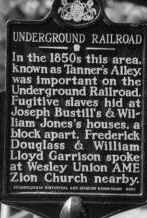
Study Areas
August 1800: Multiple enslaved persons escape from South Carolina Senator Jacob Read while residing in Philadelphia

300 Dollars
REWARD.
RAN AWAY from the subscriber, on the 18th of June inst. TWO NEGRO SERVANTS; viz a negro woman named Pat, a washer woman and cook, of about fifty two years of age -- tall and well shaped, of a black complexion. She has bad teeth, those of her under jaw are much discoloured and project a good deal. She has a full head of wooly hair -- a very cross forbidding countenance, is very impertinent, and laughs and talks loud. Pat was born in South Carolina, and speaks bad English, with the negro dialect. She has on the upper part of her breast, two pretty large lumps of flesh resembling Wens, or rather with the appearance of the marks of a burn. She carried away with her several changes of cloaths, and gowns of white muslin, and of coloured and figured printed cottons fashionably made up. She also carried away with her,
CLARA her daughter -- a very stout, robust strong made girl, of a short stature and round shouldered -- appearing to be about 14 years of age. Clara has large staring eyes, a flat nose, an oval flat face, her under jaw projecting a little, and good teeth. She is very artful and impudent, has a great fluency of speech, uses good language, and has been taught to read. -- She has the appearance of ring worms on her left cheek and chin; the skin in spots appearing much paler than the rest of her complexion, which is much lighter than her mother's -- Her hair is short and wooly. She wore a pink grounded printed cotton with a small black figure, with new fore parts.
Also ran away on Wednesday the 11th inst. (J)une, DICK and AMELIA. Dick, or as he has lately called himself, Richard Weaver, is a house servant, -- he is about 5 feet 7 inches high, rather small made, is about 25 years old, of a good smooth, black complexion -- has a flat nose, with very large open nostrils. He carried hsi head and neck as if he were stiff in the neck and shoulders, which are high and tolerably square, and his neck short -- his legs are straight but small and illy made, with scarce any calf. He has had bad teeth, is left handed, and exceedingly awkward -- he has a full head of wooly hair, which he plaits and dresses to the best advantage. His voice is small, his speech commonly mild and slow, and his manners appear extremely simple, but he is at bottom an artful knave, and when spoken to is very apt to be passionate and impertinent. Dick is a native of South-Carolina, and speaks bad English -- he seduced and carried away with him Amelia, who he called his wife.
Amelia is a very complete, well instructed ladies maid, much below the common stature and of a small make -- her complexion is that of a dark mulatto or mestizoe, nearly resembling that of the Lascars of India, with black curling hair, and a very low forehead -- her right eye has a great weakness, owing to the small pox in her infancy -- under her eyes very black -- a flat face, flat broad nose, with scarce any rising at the bridge; a large mouth, with thick lips, and good strong teeth. On the nape of her neck she has the marks of a Seton. Dresses with taste, and imitates the French style; is very sensible, and expresses herself well. She took with her a variety of clothes, fashionably made -- she has for more than two years past been liable to fits, which at times give her a wildness in her eyes -- her health is generally delicate -- she is at present likely to encrease her family, and is about 22 years of age -- she can dress hair, clear starch, has a taste for millinary and mantua-making; and as she is very ingenious, can turn her hand to anything and may probably offer herself to some milliner or mantua maker as a work woman. As Amelia has heretofore been a great favorite of a very indulgent mistress, and 'tis believed has been led away by the persuasion of her paramour Dick, if she will return to me, she will be forgiven and treated with the same tenderness she has always received.
FIFTY DOLLARS Reward for each will be paid for the delivery of Pat and Clara to the subscriber, or to any goal in the United States, so that I may get posssession of them -- One Hundred Dollars each for Dick and Amelia, on the like delivery. The subscriber warns all master of vessels, from taking these Runaway servants from the United States, and requests such of his friends and acquaintance as it may not suit to arrest them, to give information, should they hear of either of the fugitives, to the subscriber by letter directed to the post office, Philadelphia, which will find him, wherever he may pass the summer, or to the Printer of the Gazette of the United States, who will communicate it to a friend in Philadelphia to acdt on his behalf.
JACOB READ,
Of South-Carolina, corner of Fourth and Union-streets, Philadelphia.
June 25.
Notes: Jacob Read (1752-1816) was a prominent South Carolina politician, a member of the Continental Congress and represented South Carolina in the United States Senate from 1795-1801. The nation's capital was in Philadelphia during the time of his residency at the corner of Fourth and Union Streets in Philadelphia and from which location the freedom seekers in this ad escaped in June 1800. The 6th Congressional Senate adjourned on May 14, 1800, just weeks before the persons in the advertisement escaped. It was known by that time that the next session would begin in the new Senate building in Washington DC in November. From the wording in the ad above, Read was preparing to move his household to another location for the summer, very possibly back to his home in South Carolina. As Philadelphia was a much more hospitable location for free African Americans it is not surprising that these four made the decision to leave while they could.
This advertisement is unusually rich in detail about each of the enslaved persons who escaped from South Carolina slaveholder and US Senator Jacob Read while he resided in Philadelphia. He gives extraordinarily descriptive pictures of each person, including personality traits, skills, voices and social positions. Of interest is his notes on Pat and Richard Weaver, both of whom he makes a point of describing as born in South Carolina and (therefore) speaking bad English. This suggests possible native speakers of Gullah, an African American language of the South Carolina and Georgia seaboards. Compare that with his description of Pat's daughter Clara, who "has a great fluency of speech, uses good language," and Amelia, who "expresses herself well."
Of Amelia, he also notes "she is at present likely to encrease her family," indicating he believes she desires to begin having children. He obviously favors Amelia over all the others, describing her in more flattering terms than not. Nor is she described as "impertinent" (Pat), "impudent" (Clara) or "an artful knave" (Richard Weaver). She is the only one who will "be forgiven and treated with the same tenderness she has always received" if she returns.
Additional Research: With regard to Amelia, Read wrote: "On the nape of her neck she has the marks of a Seton." This refers to a common medical procedure of the time in which an irritation is produced somewhere on the body to distract the body from another more serious irritation, and thus promote healing. See this web page for more information and an illustration of a Seton needle: Museum of Health Care, "Seton Needle (From the Collection #3)," https://museumofhealthcare.blog/seton-needle-from-the-collection-3/.
Read uses great detail in describing the skin tones of these freedom seekers. In particular, he refered to Amelia's complexion as "dark mulatto or mestizoe, nearly resembling that of the Lascars of India." Mulatto is a familiar term in these advertisements. "Mestizoe" or Mestizo is less frequently seen in Mid-Atlantic fugitive slave ads and refers to a person of mixed white and Indiginous American parentage. "Lascars of India" refers to sailors from the subcontinent of India working on British ships at the time. For a history of the Lascars, see Our Migration Story, "The Lascars: Britain's Colonial Sailors," https://www.ourmigrationstory.org.uk/oms/the-lascars-britains-colonial-era-sailors.
Sources: Gazette of the United States (Philadelphia), 02 August 1800.; Hilton Head Island-Bluffton Chamber of Commerce & Visitor and Convention Bureau, "The Gullah Language and Dialect," https://www.hiltonheadisland.org/gullah/stories-and-recollections/; United States Senate, "Dates of Sessions of the Congress," https://www.senate.gov/legislative/DatesofSessionsofCongress.htm.
 Covering the history of African Americans in central Pennsylvania from the colonial
era through the Civil War.
Covering the history of African Americans in central Pennsylvania from the colonial
era through the Civil War.
Support the Afrolumens Project. Read the books:
The Year of Jubilee, Volume One: Men of God, Volume Two: Men of Muscle

